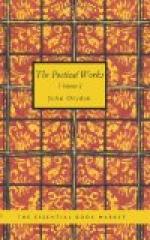When, lagging late, they cannot reach their home;
Or, rent in schism (for so their fate decrees),
Like the tumultuous college of the bees,[138]
They fight their quarrel, by themselves oppress’d;
The tyrant smiles below, and waits the falling feast.
Thus did the gentle Hind her fable
end, 1290
Nor would the Panther blame it, nor commend;
But, with affected yawnings at the close,
Seem’d to require her natural repose:
For now the streaky light began to peep;
And setting stars admonish’d both
to sleep.
The dame withdrew, and, wishing to her
guest
The peace of heaven, betook herself to
rest.
Ten thousand angels on her slumbers wait,
With glorious visions of her future state.
* * * * *
FOOTNOTES:
[Footnote 118: ‘Mother Hubbard:’ Mother Hubbard’s tale, written by Spenser.]
[Footnote 119: ‘Lion’s peace:’ liberty of conscience, and toleration of all religions.]
[Footnote 120: ‘Exiled heir:’ the Duke of York, while opposed by the favourers and abettors of the Bill of Exclusion, was obliged to retire from London.]
[Footnote 121: ‘French proselytes:’ the French refugees that came into England after the revocation of the edict of Nantes.]
[Footnote 122: ‘Hudibras:’ Butler.]
[Footnote 123: ‘Atheist names:’ alluding here and afterwards to Stillingfleet’s attacks on Dryden.]
[Footnote 124: ‘Imprimatur:’ the Bishop of London and his chaplains had formerly the examination of all books, and none could be printed without their imprimatur, or licence.]
[Footnote 125: ‘Swallow:’ this story is supposed to refer to a meeting of Roman Catholics held in the Savoy to deliberate on King James’ measures, when Father Petre (M. Martin) induced them to join the king’s side, and to remain in England.]
[Footnote 126: ‘Dorp:’ hamlet.]
[Footnote 127: ‘The tale:’ a parable of the fate of the Papists, soon fulfilled.]
[Footnote 128: ‘Old fanatic:’ Century White, a vehement writer on the Puritan side.]
[Footnote 129: ‘Toby’s:’ Tobit; see Apocrypha.]
[Footnote 130: ‘A plain good man:’ a character of King James II.]
[Footnote 131: ‘Doves:’ the clergy of the Church of England, and other religions dissenting from that of Rome.]
[Footnote 132: ‘Another farm,’ &c.: this alludes to the Popish priests, whom the king particularly favoured.]
[Footnote 133: ‘Chanticleers:’ friars.]
[Footnote 134: ‘Partlet:’ nuns.]
[Footnote 135: ‘A law:’ penal laws against Popish recusants.]
[Footnote 136: ‘Wicked weed:’ the Test Act.]
[Footnote 137: ‘Buzzard:’ Bishop Burnet.]
[Footnote 138: ‘College of the bees:’ College of Physicians.]




